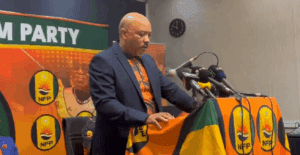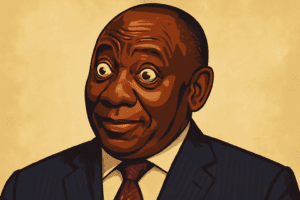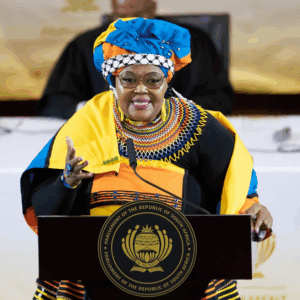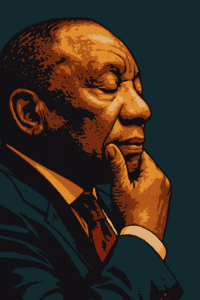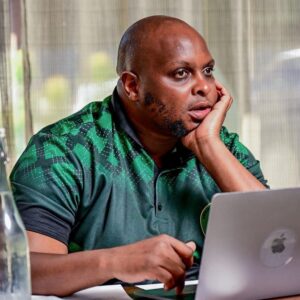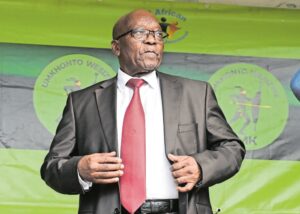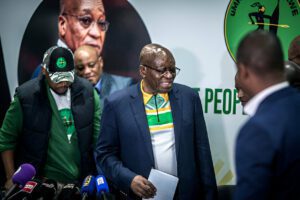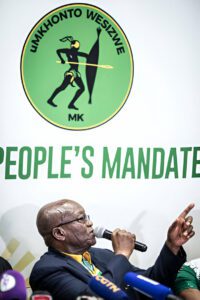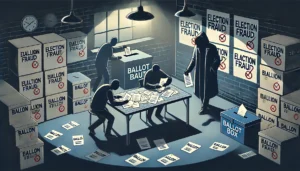Professor Patrick Bond, the Director of the Centre for Social Change at the University of Johannesburg, joins us for more. Prof, good evening and welcome. Given the anger that this has generated in the country, people are saying things like, you know, this is why people are losing their homes because of high interest rates, these are the effects of this kind of action.
Help us make sense of the issues and the effect of these actions?
Indeed it’s the era of the pitchfork, right, that famous metaphor of the bankers being burned at the stake, because really they’ve been caught. And when you think of the framing that they used when they were doing this manipulation, the chatroom and the Bloomberg business service that they used to arrange these trades, the chatroom was called ZAR Domination, Z-A-R, RAND, Domination.
And the evidence was building up, yeah. Now, this is such shocking material of, you know, let’s say hyperactive young professionals, I must say, using race and class analysis, they’re white boys, right? And so you really find, nearly all of them, you really find these banks needing to clamp down on the rampant illegality and our regulators needing to wake up because they’ve been asleep at the wheel.
So this is the time, I think, for widespread reform. And it’s so good to see the African National Congress, because really it’s their finance minister, it’s their reserve bank governor that I think we could turn to ultimately for the blame. Yeah, I want to come back to the effects.
But as you say, this is the ANC and we’ve just shared their response, but they are a government, they’re calling for stricter punishments, make the stricter punishments happen. I remember years ago when these first stories started to emerge and people were kind of hauled over the coals or suffered personally for whistleblowing on this. There was, you know, there were utterances from the finance minister at the time, basically poo-pooing this.
And now we’re seeing the evidence and the chickens, as it were, coming home to roost. People are gaslit when they raise these questions.
Yes, that’s right. To the credit of the economic freedom fighters, to say sort of there’s a left flank in the parliament, they did raise this in March 2019, not long after the same standard chartered bank was fined 40 million dollars, not 43 million rand, but about 15 times more in the New York state prosecution for the same crime. So we’re really still in the competition commission lowballing the damage. And I think when the EFF said this in March 2019 in parliament, the reply from finance minister Tito Mboweni was just as you said, he poo-pooed it.
He said, no, this isn’t really serious. And if anybody’s hurt, it’s simply their clients. We don’t really care.
So let’s say the laxity in regulation in the Reserve Bank and the Treasury now comes home to roost. And we were, you know, greylisted in February, partly for this very slovenliness by our bank regulators. OK, so greylisting, you know, partly in the story here, we should definitely get the former finance minister on to talk to us and share why he said what he said then and what he says now. But let’s go back, Patrick, to the effects. I mean, does this have the effect? Does it affect things like interest rates and people losing their homes and their assets and things?
Yes, absolutely, because at the very same time, we’ve seen deregulatory, let’s say, bank supervision and regulation in the Reserve Bank, the Treasury, even the Financial Intelligence Centre, which at the time in 2019 has been reporting up to 7 percent of GDP gets lost through illicit financial flow. So there’s no question there’s a huge problem with corporate crime.
PwC ranks South Africa number one in the world for corporate fraud and crime, money laundering, the illicit financial flows during their 2010s economic crime and fraud biannual survey. So you can you can really see that our Santon, Rosebank, Midrand, Umhlanga, Stellenbosch, central Cape Town lads have gone too far.
And now this is a time to reign them in. And I do think that the Treasury over time has also deregulated. Even the current finance minister, Enoch Godongwana, about a year and a half ago, allowed four trillion rand in our financial assets held in our insurance companies, our mutual funds, our investment trusts, our institutional investors to take money out, four trillion, by relaxing exchange controls.
That’s exactly the wrong way to go. And as you ask, what about these high interest rates? That comes with loosened exchange controls because money can flow in and out with much less friction. We need to actually put some sand in the wheels of finance.
As John Maynard Keynes once put it, we need to really slow down finance and make sure that the deals are are rigorous and honest, not the kind of scamming that is now being built. Well, maybe the pitchforks that you talked about at the beginning of our interview are justified, and maybe something worse than pitchforks. In fact, given what you’ve laid out for us tonight, there’s a lot that we can do in bringing these role players to a platform like the SABC to talk to the nation directly and to give account.
It may cover a certain amount of trade, not all trades. So it’s very hard to quantify. But given your analysis, everything you’ve heard now explaining this, what do you think is a reliable number we can put our fingers on in terms of the real cost to the to South Africa?
Well, look, I would only want to quote some rigorous forensic investigators beyond my capacity, but a trillion grand a day is being traded.
And I think it is quite critical to come to grips with, let’s say, the reparations that should be doing. It could include something like a nationalized bank, which could then be like a municipal or public service utility, the sort of thing that all of us could go to with confidence that our money is being circulated locally and savings and loans are regulated. And, you know, the old system, that’s, I think, what we need to go back to more rational than the current Wild West.
Again, just a number. I mean, is it you know, how forensically would we be able to put out, you know, our fingers on a number?
Well, look, I would add to it all the other illicit financial flows where so much escapes this country. And there again, I’ll use the Financial Intelligence Center of the Treasury.
Seven percent of GDP a year is what they feared. For some investigators, it could well be more because so much of it is is hidden away. And, you know, even President Ramaphosa found a way to do that when he was at Lonmin by setting up a Bermuda marketing wing.
So I think we do have a huge problem and it’s time to clamp down. I’ve got to let you go. But what question should we ask the SARB then? But what question would you ask the SARB?
Well, I would say the South African Reserve Bank should as a privately owned, not a state entity, should be asking really serious conflict of interest questions because the institutions that own them are the very banks that they’ve been nudge, nudge, wink, wink on illicit financial flows.
It’s really time to think about, I think, nationalizing the Reserve Bank, just like every other civilized economy has a Reserve Bank that can serve the public interest, not just the private banks. Patrick Bond, thank you for talking to us tonight. The director for the Center of Social Change at the University of Johannesburg.


